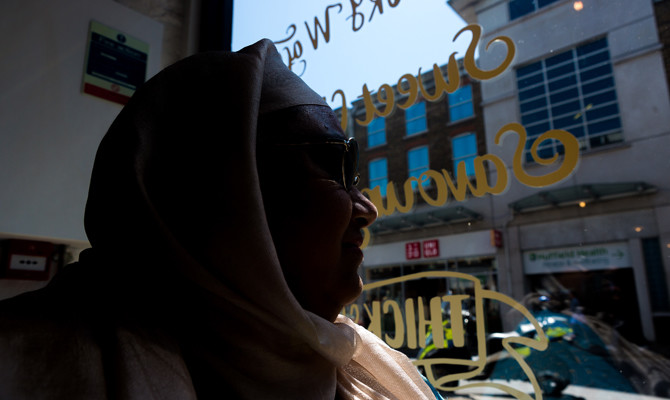LONDON: Farida Miah was still reeling from the shock of learning that her husband had taken a second wife when she found out he had divorced her and ended their 18-year marriage.
Miah, a British citizen of Bangladeshi origin, contacted a UK civil court and learned that her husband had managed to bypass the dowry settlement due to her under the terms of their Islamic marriage, leaving her with nothing.
“He has all we owned,” said Miah, who lives in London and whose name has been changed to protect her identity.
Her problems arose because — like many Muslim women in the UK — she had “an Islamic marriage, but an English divorce” via a British civil court. More than a decade later, she is still struggling to put her life back together after finding herself stuck between these conflicting cultural and legal codes.
“The UK courts say there is nothing they can do — there is no law to help. Everywhere I turned was blocked to me,” she told Arab News.
Rising divorce rates among British Muslim communities have prompted questions over the status of Islamic marriage — known in Arabic as “nikah” — in the UK. Lacking formal legal recognition, it denies couples the protections available in civil unions if the relationship breaks down.
“The state only affords you rights through the institution of marriage, without that you have no access to support,” said Samia Bano, a senior lecturer specializing in Muslim family law at SOAS University of London, a leading institution for Middle East studies. While the fallout can negatively affect both parties, women, in particular, are “often left in precarious situations,” she said.
In 2017, a survey by UK TV station Channel 4 of 1,000 British Muslim women found that almost two-thirds had a nikah-only marriage and that more than a quarter did not realize this meant they would be denied rights and protections they would have had for a marriage union that was legally recognized.
For these women, the discovery can be “devastating,” said Sarah Khan-Bashir, a lawyer specializing in sharia divorce. “They think they’ve got all the rights that husbands and wives should have, but they don’t, and they find out when it’s far too late.”
One client faced losing her home after her husband of 23 years died as she was unable to produce proof that he had divorced his first wife. Khan-Bashir had to explain to her that she was effectively a cohabitee with a nikah, news that left the client shaking visibly.
Family lawyer Siddique Patel said that nikah-only marriage is becoming more popular. “Among the under-30s, a lot of Muslim men and women who were born and bred in the UK are coming to us with unregistered marriages.”
Lack of awareness is a major factor, but sometimes the wealthier partner — usually the man — bypasses a civil ceremony to escape equal division of assets in a civil divorce. “They’re scared 50:50 splits will happen,” Patel said, adding that “women lose out more (often) than men.”
Patel is part of the team behind the Register Our Marriage campaign, which is calling for compulsory registration of all marriages and the reform of the 1949 Marriage Act to cover all faiths. This 69-year-old law is no longer “fit for purpose” in a modern multicultural society, said Islamic law expert Aina Khan, who launched the campaign. The Act only recognizes religious ceremonies conducted in the Anglican, Quaker Christian and Jewish traditions.
Although people of all other religions are affected, others tend to register, while the campaign estimates that around 80 percent of newly married Muslims do not.
Dr. Ahmed Al-Dubayan, director general of the Islamic Cultural Center and the London Central Mosque, said UK Muslims need to have both ceremonies. “As British citizens, or people living in the UK, we make the civil marriage a condition because it’s required by law,” he said.
Some couples prefer the nikah-only marriage, which can be resolved without recourse to the courts if the relationship breaks down.
“The Islamic marriage is easy. We don’t need an imam, we don’t need a registry office, we don’t need a specific building, it’s simple,” said Dr. Haitham Al-Haddad, a British Muslim scholar who sits on the board of the Islamic Sharia Council. “The civil relationship, if they want to end their marriage, is a nightmare for both sides,” he added.
Couples seeking an Islamic divorce can arrange their affairs through sharia councils or local imams. Contrary to concerns that they provide a “parallel legal system,” these bodies have no jurisdiction in the UK, but have significant sway among British Muslim communities.
Waiting outside Dr. Al-Haddad’s office above the East London Mosque to discuss dissolving her 18-year marriage, Sumaiya Ali, whose name has also been changed to protect her identity, said this route is “a lot easier” and cheaper than going through the UK divorce courts. “It’s good for me because I don’t have to do that,” said Ali.
In Islam, husbands can divorce their wives by saying the Arabic word “talaq” — meaning repudiation or divorce — three times, but wives are required to obtain consent from their husbands to end the marriage. Failing that, the sharia council is a woman’s only recourse for pursuing “khula” — the Islamic procedure in which the wife initiates the divorce.
Based on personal experience, Dr. Al-Haddad estimated that 75 to 80 percent of cases heard by Islamic councils in the UK are granted, but in other European countries where sharia councils are not available, women are “really suffering because there are no bodies to end their marriages,” he said.
With cuts to legal aid increasing the cost of civil divorce ceremonies, more British Muslim couples than ever are turning to sharia councils. In December 2016, the Casey Review on integration in UK communities suggested that the influence of sharia councils was growing and highlighted concerns over their “discriminatory practices against women.”
Across the UK, “experiences of sharia courts vary vastly” and while some provide the support women seek, there are “undoubtedly instances” where women’s rights are compromised, said Sajda Mughal, CEO of the JAN Trust, a non-profit organization supporting marginalized women.
Southall Black Sisters, a non-profit organization representing ethnic minority women in London, believes there should be one law for all marriages in England and Wales. It cites “incompetence”, “maladministration” and “flagrant human rights abuses” among the problems faced by women who use religious forums and tribunals to resolve family disputes.
When Miah, 44, told her story to an east London sharia council, hoping it would help her retrieve the money due under the terms of her nikah marriage, she said the response was “appalling.” She was advised her to go back to the husband as the divorce had been “English” rather than Islamic.
Having used Miah’s documents to secure his right to remain in the UK and lived off her earnings during their marriage, her husband — a cousin on her father’s side — began proceedings to bring a new wife over from Bangladesh.
“He invited a relative to the wedding — that’s how I found out he had a second wife,” said Miah. This was the last straw after being forced to marry a man 13 years her senior who she accused of marrying her to get a UK passport.
Feeling let down by the law in the land of her birth as well as representatives of the faith she grew up with, Miah suffered a series of health and psychological setbacks.
Working with counsellors at Southall Black Sisters helped her to find stability, but she still feels hurt that her parents forced her to marry at the age of 12 when she was “still a little girl playing with my dolls.”
More than 13 years after the divorce came through on March 16, 2005 — Miah’s birthday — she is still trying to put the past behind her. “When I see the date on the certificate, I think, that day I was born free and now on my birthday I am free again. I just look at it like that.”





















